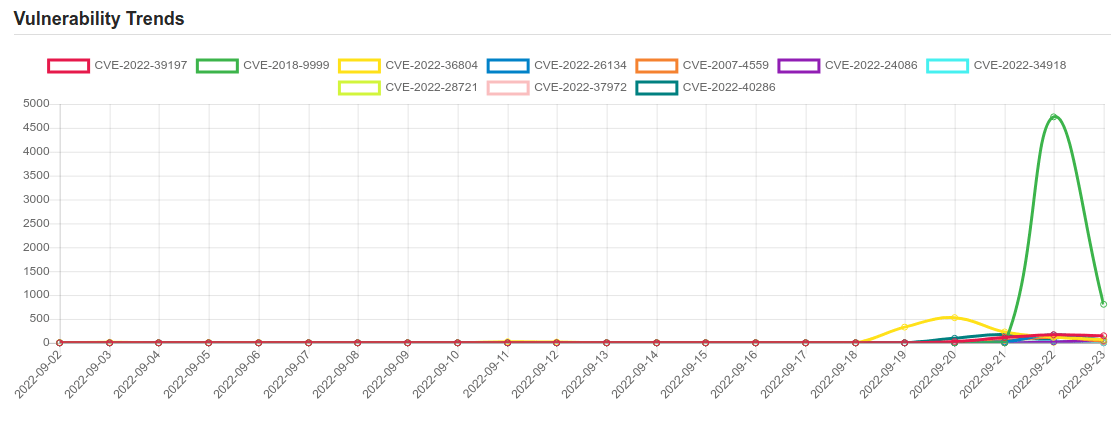Daily Vulnerability Trends: Sat Sep 24 2022

| CVE NAME | CVE Description |
| CVE-2022-37972 | Microsoft Endpoint Configuration Manager Spoofing Vulnerability. |
| CVE-2022-40286 | No description provided |
| CVE-2022-35405 | Zoho ManageEngine Password Manager Pro before 12101 and PAM360 before 5510 are vulnerable to unauthenticated remote code execution. (This also affects ManageEngine Access Manager Plus before 4303 with authentication.) |
| CVE-2022-36934 | An integer overflow in WhatsApp could result in remote code execution in an established video call. |
| CVE-2022-3236 | A code injection vulnerability in the User Portal and Webadmin allows a remote attacker to execute code in Sophos Firewall version v19.0 MR1 and older. |
| CVE-2022-2586 | No description provided |
| CVE-2022-3172 | No description provided |
| CVE-2022-3080 | By sending specific queries to the resolver, an attacker can cause named to crash. |
| CVE-2022-35951 | Redis is an in-memory database that persists on disk. Versions 7.0.0 and above, prior to 7.0.5 are vulnerable to an Integer Overflow. Executing an `XAUTOCLAIM` command on a stream key in a specific state, with a specially crafted `COUNT` argument may cause an integer overflow, a subsequent heap overflow, and potentially lead to remote code execution. This has been patched in Redis version 7.0.5. No known workarounds exist. |
| CVE-2022-2906 | An attacker can leverage this flaw to gradually erode available memory to the point where named crashes for lack of resources. Upon restart the attacker would have to begin again, but nevertheless there is the potential to deny service. |
| CVE-2022-41140 | No description provided |
| CVE-2022-38177 | By spoofing the target resolver with responses that have a malformed ECDSA signature, an attacker can trigger a small memory leak. It is possible to gradually erode available memory to the point where named crashes for lack of resources. |
| CVE-2022-39197 | An XSS (Cross Site Scripting) vulnerability was found in HelpSystems Cobalt Strike through 4.7 that allowed a remote attacker to execute HTML on the Cobalt Strike teamserver. To exploit the vulnerability, one must first inspect a Cobalt Strike payload, and then modify the username field in the payload (or create a new payload with the extracted information and then modify that username field to be malformed). |
| CVE-2018-9999 | In Zulip Server versions before 1.7.2, there was an XSS issue with user uploads and the (default) LOCAL_UPLOADS_DIR storage backend. |
| CVE-2022-36804 | Multiple API endpoints in Atlassian Bitbucket Server and Data Center 7.0.0 before version 7.6.17, from version 7.7.0 before version 7.17.10, from version 7.18.0 before version 7.21.4, from version 8.0.0 before version 8.0.3, from version 8.1.0 before version 8.1.3, and from version 8.2.0 before version 8.2.2, and from version 8.3.0 before 8.3.1 allows remote attackers with read permissions to a public or private Bitbucket repository to execute arbitrary code by sending a malicious HTTP request. This vulnerability was reported via our Bug Bounty Program by TheGrandPew. |
| CVE-2022-26134 | In affected versions of Confluence Server and Data Center, an OGNL injection vulnerability exists that would allow an unauthenticated attacker to execute arbitrary code on a Confluence Server or Data Center instance. The affected versions are from 1.3.0 before 7.4.17, from 7.13.0 before 7.13.7, from 7.14.0 before 7.14.3, from 7.15.0 before 7.15.2, from 7.16.0 before 7.16.4, from 7.17.0 before 7.17.4, and from 7.18.0 before 7.18.1. |
| CVE-2007-4559 | Directory traversal vulnerability in the (1) extract and (2) extractall functions in the tarfile module in Python allows user-assisted remote attackers to overwrite arbitrary files via a .. (dot dot) sequence in filenames in a TAR archive, a related issue to CVE-2001-1267. |
| CVE-2022-24086 | Adobe Commerce versions 2.4.3-p1 (and earlier) and 2.3.7-p2 (and earlier) are affected by an improper input validation vulnerability during the checkout process. Exploitation of this issue does not require user interaction and could result in arbitrary code execution. |
| CVE-2022-34918 | An issue was discovered in the Linux kernel through 5.18.9. A type confusion bug in nft_set_elem_init (leading to a buffer overflow) could be used by a local attacker to escalate privileges, a different vulnerability than CVE-2022-32250. (The attacker can obtain root access, but must start with an unprivileged user namespace to obtain CAP_NET_ADMIN access.) This can be fixed in nft_setelem_parse_data in net/netfilter/nf_tables_api.c. |
| CVE-2022-28721 | Multiple HP printers buffer overflow | CVE-2022-28721 |
A considerable amount of time and effort goes into maintaining this website, creating backend automation and creating new features and content for you to make actionable intelligence decisions. Everyone that supports the site helps enable new functionality.
If you like the site, please support us on Patreon using the button below

To keep up to date follow us on the below channels.




![[RANSOMHUB] - Ransomware Victim: www[.]famcomachine[.]com 6 image](https://www.redpacketsecurity.com/wp-content/uploads/2024/09/image-300x300.png)